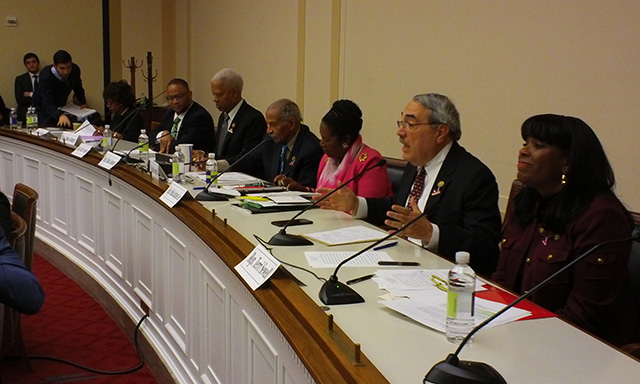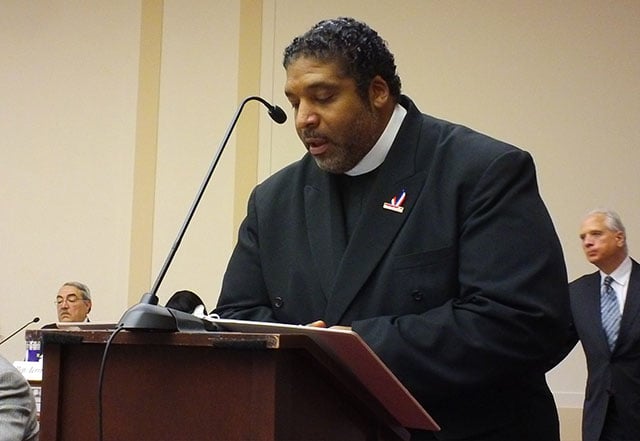
Congressional briefings are typically dull affairs, usually with only a few dozen participants, but it was standing room only in a House Judiciary Committee hearing room on April 21, when nine members of Congress, their staff and 200 activists gathered to address the present crisis in US democracy: voter suppression and the manipulation of US elections.
In 2016 – the first presidential election since the US Supreme Court’s gutting of the Voting Rights Act – a slew of new malicious laws and tactics are disenfranchising millions of Americans, even as the private control of US vote-counting technology has come under renewed scrutiny in a primary season marked by allegations of fraud and election rigging.
Nine members of Congress condemned the “new Jim Crow” laws that have been forced on over half the states in the US.
This high-stakes, emotionally charged election cycle has seen widespread closure of polling locations, unprecedented voter roll purges, voting machine failures and extreme waiting lines that cause countless voters to turn away without having cast a ballot. Many have been given “provisional” ballots that are simply not counted. Irregularities in Arizona, North Carolina, Wisconsin and New York have engendered intraparty accusations and lawsuits, exposing a dysfunctional and often undemocratic election process.
The nine members of Congress who spoke, all from predominantly minority districts, loudly condemned the “new Jim Crow” laws that have been forced on over half the states in the US, and which the lawmakers believe were designed to deliberately suppress voters in their districts, particularly people of color, the poor, the elderly and students.
 Rep. G. K. Butterfield speaking on voter suppression. (Photo: National Election Defense Coalition)
Rep. G. K. Butterfield speaking on voter suppression. (Photo: National Election Defense Coalition)
Representatives included the dean of the House and ranking member of the Judiciary Committee, John Conyers, and longtime civil rights champion Elijah Cummings. Others who made passionate and sometimes angry statements included Representatives G. K. Butterfield (co-chair of the Congressional Black Caucus), Sheila Jackson Lee, Terri Sewell, Maxine Waters, Marc Veasey, Alma Adams and Hank Johnson.
The briefing’s sponsors, the National Election Defense Coalition and the Transformative Justice Coalition, support the urgent call for a new legislative agenda and political fusion movement to protect democracy, restore voting rights and ensure that every ballot cast is also counted in a secure, public, transparent process.
“There is a very insidious, treacherous and deceitful method of voter suppression, and it has to do with the integrity of the voting process itself.”
Rep. Hank Johnson (D-Georgia) brought much needed attention to a crucial aspect of the election crisis: the aging, hackable voting technology used nationwide. Johnson cited the fact that the vote-counting software in these machines is still programmed by a cadre of private companies on proprietary software inaccessible to elections officials and the public.
“There is a very insidious, treacherous and deceitful method of voter suppression,” stated Johnson, “and it has to do with the integrity of the voting process itself.”
As the Brennan Center for Justice recently reported, the United States’ current voting systems are falling apart over a decade after they were bought with $3.9 billion in funds allocated by Congress in the Help America Vote Act. “How many of you believe that we should be using a touch-screen voting machine that is 10 years old, operating on year 2000 technology and software, with no security upgrades available for more than a decade?” asked Johnson.
Johnson touched on the concerns of both voters and candidates in this election season when he discussed the well-known vulnerability of these voting systems to internal error, fraud and outsider hacking — claims supported by top computer scientists and cybersecurity experts from MIT, Princeton, the US Department of Energy’s Argonne National Labs and many others whose warnings have largely been unheeded.
“Can you imagine why we have had elections where polls predicted that a certain person would win the election by five points and then it ends up the person loses the election by 10 points? Well, one possibility, and I think it’s a very good one, is that someone’s manipulating the counting of the votes. Someone is hacking into these computers that tabulate the votes,” Johnson said.
 Rev. William Barber, president of the North Carolina NAACP, speaking on voter suppression. (Photo: National Election Defense Coalition)
Rev. William Barber, president of the North Carolina NAACP, speaking on voter suppression. (Photo: National Election Defense Coalition)
The partisan control of voting technology has been a longstanding concern of Prof. Robert Fitrakis, Ph.D. and J.D., who testified on the widely contested 2000 election, which was marked by voter suppression of people of color, and on his involvement as a lawyer in contesting the 2004 elections, in which the computer architecture of election night was in the hands of far-right-wing partisan companies and election officials.
“The most dangerous thing in our democracy right now is the fact that partisan, for-profit corporations using secret proprietary software provide the voting hardware and the software to register us to vote, count our votes and report election results,” Fitrakis said. “I want to know why these private companies who are not using open-source software are counting our votes, registering our votes and then doing the central tabulation.”
To save democracy, it’s important to both take to the streets and take to the Hill.
This week, to begin addressing some of these problems, Johnson will introduce the Verifying Optimal Tools for Elections Act of 2016 (VOTE Act). The bill calls for state-controlled, open-source programming of all voting technology, and provides more than $125 million in Help America Vote Act grants to assist states in replacing voting machines. The bill would also allocate $50 million in grants for training poll workers, adopting new voting technologies and safeguards, and, crucially, removing control of voting machine source code software from private vendors.
There are also clear legislative strategies for meeting the broader challenge of voter suppression. Congress can act now to pass the Voting Rights Advancement Act (S. 1659 and H.R. 2867), which has more than 150 co-sponsors in the House and bipartisan support in the Senate. The legislation would restore the Voting Rights Act and help to end the voter access crises.
Johnson from Ben-Zion Ptashnik on Vimeo.
This battle for democracy comes to a head this year as 32 states have promulgated new laws in response to the fabricated issue of “voter fraud.” Sixteen of these states will see their plans go into effect for the first time in the crucial 2016 elections.
“We must emphatically ask the politicians that brought us these new Jim Crow laws to show us the fraud,” stated Joel Segal, legislative director of the National Election Defense Coalition and a former staff member for Representative Conyers. He cited a Washington Post report showing that a comprehensive investigation of voter impersonation found only 31 credible incidents of so-called “voter fraud” out of 1 billion ballots cast in the United States.
Barbara R. Arnwine, president of the Transformative Justice Coalition, and former executive director of the Lawyers’ Committee for Civil Rights Under Law, put the current wave of voter suppression laws in the historical context of the poll tax and other attempts to disenfranchise voters of color.
The keynote presenter, Rev. William Barber II, president of the North Carolina NAACP, and leader of the Moral Mondays protest movement, described the avalanche of voter suppression laws unleashed in North Carolina immediately after the Supreme Court gutted Section 5 of the Voting Rights Act.
Barber also helped lead the Democracy Awakening protests that took place outside Congress on April 18, and saw civil rights organizations, unions, social justice groups and environmentalists all standing together to demand the restoration of voting rights and election campaign finance safeguards.
This “inside-outside strategy” embodied in twin actions — focusing on official congressional actions and grassroots direct action — is the strategy that Martin Luther King Jr. and other civil rights activists employed to transform the political landscape a generation ago. To save democracy, it’s important to both take to the streets and take to the Hill.
The briefing sparked movement in the halls of Congress: Rep. G. K. Butterfield announced that voter suppression would now be a top priority of the Congressional Black Caucus.
Many members of Congress articulated the need to translate widespread outrage about election manipulation into an actionable voting rights agenda that protects the coming general election, and all future elections. It is clear that accomplishing that goal will require a political grassroots movement similar to the suffrage and civil rights movements that expanded the vote franchise in the last century.
Conyers noted with pleasure that the crowd at the hearing was marked by racial diversity, which he said would be needed to support a broad-based movement to restore democracy to US elections.
Congressional staff and organizers are planning a series of field hearings and town hall meetings across the nation aimed at giving voice to citizens who were not allowed to vote in the 2016 presidential primaries, and pushing for repeal of voter suppression laws. The first field hearings will be held in Michigan, Texas, Alabama and North Carolina. Further congressional hearings will be scheduled this summer and fall.
Join us in defending the truth before it’s too late
The future of independent journalism is uncertain, and the consequences of losing it are too grave to ignore. We have hours left to raise the $12,0000 still needed to ensure Truthout remains safe, strong, and free. Every dollar raised goes directly toward the costs of producing news you can trust.
Please give what you can — because by supporting us with a tax-deductible donation, you’re not just preserving a source of news, you’re helping to safeguard what’s left of our democracy.